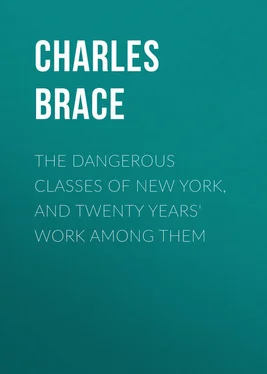Charles Brace - The Dangerous Classes of New York, and Twenty Years' Work Among Them
Здесь есть возможность читать онлайн «Charles Brace - The Dangerous Classes of New York, and Twenty Years' Work Among Them» — ознакомительный отрывок электронной книги совершенно бесплатно, а после прочтения отрывка купить полную версию. В некоторых случаях можно слушать аудио, скачать через торрент в формате fb2 и присутствует краткое содержание. Издательство: Иностранный паблик, Жанр: foreign_antique, foreign_prose, на английском языке. Описание произведения, (предисловие) а так же отзывы посетителей доступны на портале библиотеки ЛибКат.
- Название:The Dangerous Classes of New York, and Twenty Years' Work Among Them
- Автор:
- Издательство:Иностранный паблик
- Жанр:
- Год:неизвестен
- ISBN:нет данных
- Рейтинг книги:5 / 5. Голосов: 1
-
Избранное:Добавить в избранное
- Отзывы:
-
Ваша оценка:
- 100
- 1
- 2
- 3
- 4
- 5
The Dangerous Classes of New York, and Twenty Years' Work Among Them: краткое содержание, описание и аннотация
Предлагаем к чтению аннотацию, описание, краткое содержание или предисловие (зависит от того, что написал сам автор книги «The Dangerous Classes of New York, and Twenty Years' Work Among Them»). Если вы не нашли необходимую информацию о книге — напишите в комментариях, мы постараемся отыскать её.
The Dangerous Classes of New York, and Twenty Years' Work Among Them — читать онлайн ознакомительный отрывок
Ниже представлен текст книги, разбитый по страницам. Система сохранения места последней прочитанной страницы, позволяет с удобством читать онлайн бесплатно книгу «The Dangerous Classes of New York, and Twenty Years' Work Among Them», без необходимости каждый раз заново искать на чём Вы остановились. Поставьте закладку, и сможете в любой момент перейти на страницу, на которой закончили чтение.
Интервал:
Закладка:
All these great masses of destitute, miserable, and criminal persons believe that for ages the rich have had all the good things of life, while to them have been left the evil things. Capital to them is the tyrant.
Let but Law lift its hand from them for a season, or let the civilizing influences of American life fail to reach them, and, if the opportunity offered, we should see an explosion from this class which might leave this city in ashes and blood.
To those incredulous of this, we would recall the scenes in our streets during the riots in 1863, when, for a short period, the guardians of good order – the local militia – had been withdrawn for national purposes, and when the ignorant masses were excited by dread of the draft.
Who will ever forget the marvelous rapidity with which the better streets were filled with a ruffianly and desperate multitude, such as in ordinary times we seldom see – creatures who seemed to have crept from their burrows and dens to join in the plunder of the city – how quickly certain houses were marked out for sacking and ruin, and what wild and brutal crimes were committed on the unoffending negroes? It will be recalled, too, how much women figured in these horrible scenes, as they did in the Communistic outbreak in Paris. It was evident to all careful observers then, that had another day of license been given the crowd, the attack would have been directed at the apparent wealth of the city – the banks, jewelers' shops, and rich private houses.
No one doubted then, or during the Orange riot of 1871, the existence of "dangerous classes" in New York. And yet the separate members of these riotous and ruffianly masses are simply neglected and street-wandering children who have come to early manhood.
The true preventive of social catastrophes like these, are just such Christian reformatory and educational movements as we are about to describe.
Of the number of the distinctly homeless and vagrant youth in New York, it is difficult to speak with precision. We should be inclined to estimate it, after long observation, as fluctuating each year between 20,000 and 30,000. [The homeless children who come each year under the charitable efforts afterwards to be described amount to some 12,000.] But to these, as they mature, must be added, in the composition of the dangerous classes, all those who are professionally criminal, and who have homes and lodging-places. And again to these, portions of that vast and ignorant [It should be remembered that there are in this city over 60,000 persons above ten years of age who cannot write their names.] multitude, who, in prosperous times, just keep their heads above water, who are pressed down by poverty or misfortune, and who look with envy and greed at the signs of wealth and luxury all around them, while they themselves have nothing but hardship, penury, and unceasing drudgery.
CHAPTER III
The great practical division of causes of crime may be made into preventible and non-preventible. Among the preventible, or those which can be in good part removed, may be placed ignorance, intemperance, over-crowding of population, want of work, idleness, vagrancy, the weakness of the marriage-tie, and bad legislation.
Among those which cannot be entirely removed are inheritance, the effects of emigration, orphanage, accident or misfortune, the strength of the sexual and other passions, and a natural weakness of moral or mental powers.
There needs hardly a word to be said in this country on the intimate connection between ignorance and crime.
The precise statistical relation between them in the State of New York would seem to be this: about thirty-one per cent. of the adult criminals cannot read or write, while of the adult population at large about six (6.08) per cent. are illiterate; or nearly one-third of the crime is committed by six-hundredths of the population. In the city prisons for 1870, out of 49,423 criminals, 18,442 could not write and could barely read, or more than thirty-three per cent.
In the Reformatories of the country, according to the statement of Dr. Bittinger before the National Congress on prison-discipline at Cincinnati, out of the average number of the inmates for 1868, of 7,963 twenty-seven per cent. were wholly illiterate.
Very great criminality is, of course, possible with high education; but in the immense majority of cases a very small degree of mental training or intellectual tastes is a preventive of idleness and consequent crime and of extreme poverty. The difference between knowing how to read and not knowing will often be the line between utter poverty and a capacity for various occupations.
Among the inmates of the city prisons a large percentage are without a trade, and no doubt this idle condition is largely due to their ignorance and is one of the great stimulants to their criminal course. Who can say how much the knowledge of Geography alone may stimulate a child or a youth to emigrate, and thus leave his immediate temptations and escape pressing poverty?
Out of 452 criminal children received into the House of Refuge in New York during 1870, only 187 had both parents living, so that nearly sixty per cent. had lost one or both of their parents, or were otherwise separated from them.
According to Dr. Bittinger, [Transactions of the National Congress, p. 279.] of the 7,963 inmates of the reformatories in the United States in 1870, fifty-five per cent. were orphans or half orphans.
The following figures strikingly show the extent to which orphanage and inheritance influence the moral condition of children.
Mettrai, the celebrated French reformatory, has received since its foundation 3,580 youthful inmates. Of these, there are 707 whose parents are convicts; 308 whose parents live in concubinage; 534 "natural" children; 221 foundlings; 504 children of a second marriage; and 1,542 without either father or mother. [Une visite a Mettrai. Paris, 1868.]
An intelligent French writer, M. de Marsangy, [Moralisation de l'enfance coupable, p. 18.] in writing of the causes of juvenile crime in France, says that "a fifth of those who have been the objects of judicial pursuit are composed of orphans; the half have no father, a quarter no mother, and as for those who have a family, nearly all are dragged by it into evil."
There is no question that the breaking of the ties with one's country has a bad moral effect, especially on a laboring class. The Emigrant is released from the social inspection and judgment to which he has been subjected at home, and the tie of church and priesthood is weakened. If a Roman Catholic, he is often a worse Catholic, without being a better Protestant. If a Protestant, he often becomes indifferent. Moral ties are loosened with the religious. The intervening process which occurs here, between his abandoning the old state of things and fitting himself to the new, is not favorable to morals or character.
The consequence is, that an immense proportion of our ignorant and criminal class are foreign-born; and of the dangerous classes here, a very large part, though native-born, are of foreign parentage. Thus, out of the whole number of foreigners in New York State, in 1860, 16.69 per cent. could not read or write; while of the native-born only 1.83 per cent. were illiterate.
Of the 49,423 prisoners in our city prisons, in prison for one year before January, 1870, 32,225 were of foreign birth, and, no doubt, a large proportion of the remainder of foreign parentage. Of the foreign-born, 21,887 were from Ireland; and yet at home the Irish are one of the most law-abiding and virtuous of populations – the proportion of criminals being smaller than in England or Scotland.
Читать дальшеИнтервал:
Закладка:
Похожие книги на «The Dangerous Classes of New York, and Twenty Years' Work Among Them»
Представляем Вашему вниманию похожие книги на «The Dangerous Classes of New York, and Twenty Years' Work Among Them» списком для выбора. Мы отобрали схожую по названию и смыслу литературу в надежде предоставить читателям больше вариантов отыскать новые, интересные, ещё непрочитанные произведения.
Обсуждение, отзывы о книге «The Dangerous Classes of New York, and Twenty Years' Work Among Them» и просто собственные мнения читателей. Оставьте ваши комментарии, напишите, что Вы думаете о произведении, его смысле или главных героях. Укажите что конкретно понравилось, а что нет, и почему Вы так считаете.












